Are you looking for a career that offers a steady demand for your services, as well as opportunities for growth and development? Consider becoming a plumbing designer! As a plumbing designer, you’ll play an important role in designing safe and efficient plumbing systems for buildings of all kinds.

Quick Navigation:
Reasons to Become a Plumbing Designer
There are several reasons why you might want to consider becoming a plumbing designer. First and foremost, there is a strong demand for plumbing designers in the construction industry. As new buildings are constructed and existing ones are renovated, plumbing designers are needed to ensure that the plumbing systems are up to code and functioning properly.
Additionally, becoming a plumbing designer offers opportunities for growth and development. As you gain experience and knowledge, you may be able to take on more complex projects or move into a leadership role within your organization.
How to Become a Plumbing Designer
To become a plumbing designer, you’ll typically need to have a degree in engineering, architecture, or a related field. Some employers may also require certification or licensure, which typically involves passing an exam.
In addition to formal education and certification, it’s important to gain practical experience in the field. Consider seeking out internships or entry-level positions at plumbing design firms to get started.
You may also Like this Article:
Skills for Plumbing Designers
Successful plumbing designers possess a variety of skills and qualities, including:
- Strong knowledge of plumbing codes and regulations
- Understanding of building systems and construction processes
- Attention to detail
- Strong communication skills
- Ability to work independently
Career Development for Plumbing Designers
As a plumbing designer, you’ll have opportunities for career development as you gain experience and knowledge in the field. You may be able to take on more complex projects, move into a leadership role, or even start your own plumbing design firm.
Requirements for Plumbing Designers
In addition to education and certification, many employers look for plumbing designers who have experience with computer-aided design (CAD) software and other design tools. Familiarity with building information modeling (BIM) software may also be helpful.
Interview Preparation for Plumbing Designers
When preparing for a job interview as a plumbing designer, be sure to highlight your knowledge of plumbing codes and regulations, as well as your experience with CAD and BIM software. Be prepared to discuss specific projects you’ve worked on and any challenges you’ve faced during the design process.
Work-Life Balance as a Plumbing Designer
As a plumbing designer, you’ll typically work in an office setting during regular business hours. This can offer a good work-life balance, as you’ll have evenings and weekends free to spend with family and pursue hobbies and interests.
A Day in the Life of a Plumbing Designer
Here’s a breakdown of what a typical day might look like for a plumbing designer:
| Time | Activity |
|---|---|
| 8:00 am | Arrive at office, check email and voicemail |
| 9:00 am | Meet with project team to discuss progress and address any issues |
| 10:00 am | Begin designing plumbing system for new commercial building |
| 12:00 pm | Lunch break |
| 1:00 pm | Continue designing plumbing system |
| 3:00 pm | Meet with client to review design plans and address any concerns |
| 4:00 pm | Wrap up work for the day, make notes for tomorrow’s tasks |
Frequently Asked Questions
What is the job outlook for plumbing designers?
According to the U.S. Bureau of Labor Statistics, employment of mechanical engineers (including plumbing designers) is projected to grow 2 percent from 2021 to 2031, about as fast as the average for all occupations.
What is the average salary for a plumbing designer?
According to Glassdoor, the national average salary for a plumbing designer is $69,000 per year.
What are some common challenges facing plumbing designers?
Plumbing designers may face challenges such as navigating complex building codes and regulations, designing systems that are both safe and efficient, and managing projects with tight deadlines and budgets.
Wrapping Up
Becoming a plumbing designer can offer a rewarding career with opportunities for growth and development. By gaining the necessary education, certification, and practical experience, you can position yourself for success in this in-demand field.










